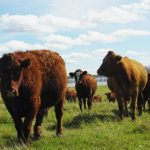It is a telling sign of how far Saskatchewan’s organic industry has evolved since the turn of the century.
Six years ago, organizers of the Exploring Sustainable Alternatives conference couldn’t find enough organic products to put together an all-organic menu. Only about half of the ingredients they used to feed lunch and supper to a crowd of 180 people gathered in Humboldt, Sask., was organic.
They had trouble finding organic versions of fundamental ingredients like celery, onions and garlic. The cook made egg salad sandwiches with conventional eggs, mayonnaise and butter and while the bread was organic, it proved tiny, dense and hard to work with.
Read Also

British Columbia farmers to receive increased AgriStability supports
B.C. farmers to receive bump in AgriStability compensations due to weather concerns, international trade instability
They had to order organic milk from the United States, which had gone sour by the time it arrived.
“I didn’t think it would be that difficult,” said then conference co-ordinator Hart Haidn.
Six years later many of those supply shortcomings have been addressed.
It remains more of a challenge to find ingredients for an organic banquet than for a conventional one, but it is at least possible to put on a spread where most items are 100 percent certified organic.
Barbara Willick can testify to that. She is the co-ordinator of the upcoming Organic Connections conference, which kicks off Nov. 12 in Saskatoon.
Two lunches, an evening of tapas and coffee-time snacks are included in the $275 registration fee for the three-day event.
Those who want to attend the supper on Sunday have to pay an additional $60.
Willick expects to be serving at least 500 meals at each of the lunches and another 350 at supper. Lining up the ingredients required to feed such a large number of people required more than making a few stops at the supermarket.
“It has been quite a challenge,” she said.
The lunches will feature beef frajolaki and buffalo stew served in bread bowls. The supper entrée will be bison roast. All of the meals will be accompanied by organic vegetables, fruits and desserts.
In addition, Willick is organizing a tapas style snack menu for the Monday evening event at the Western Development Museum, which includes beef on a bun, fish portions, artisan bread and organic beer. There will also be tea, coffee, cheese, bread and fruit served during coffee breaks.
“The only thing I was having trouble with was the cheeses. It was just so cost prohibitive,” said Willick.
Actually, that wasn’t the only troublesome ingredient. In addition to having to substitute organic cheese with regular cheese, she had to use wild fish from northern Saskatchewan on the menu because she couldn’t find organic fish.
Most ingredients are coming from local Saskatoon providers like Steep Hill Food Co-operative, Dad’s Nutrition Centre, Christie’s Mayfair Bakery, Paddock Wood Brewing Supplies and Costco Wholesale, which has greatly expanded its organic offerings in recent years.
But some of it comes from far-away places, like the fair trade coffee from Bean North Coffee Roasting Co. in Whitehorse, Yukon.
Willick estimated she will end up paying a 15 to 20 percent premium for providing an organic spread. The lunches are costing her $21 a plate, while the supper will come in at about $35 to $40 a plate.
It has been a challenge co-ordinating food for the event. For instance, all of the meat had to go to a provincially inspected plant before it would be accepted by the chef at the event centre.
Despite the additional hassles, Willick said it is rewarding to offer conference growers a slice of bread made from wheat grown in a nearby field, processed at a mill in Maymont, Sask., and baked into an organic loaf at a Saskatoon bakery.
And this time it won’t be a dense little loaf that is hard to use in a sandwich.
















